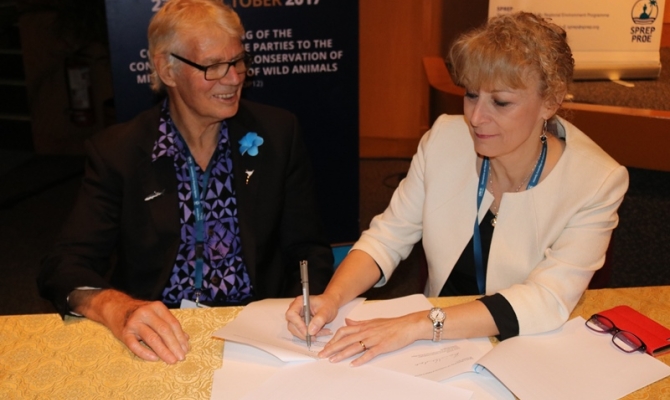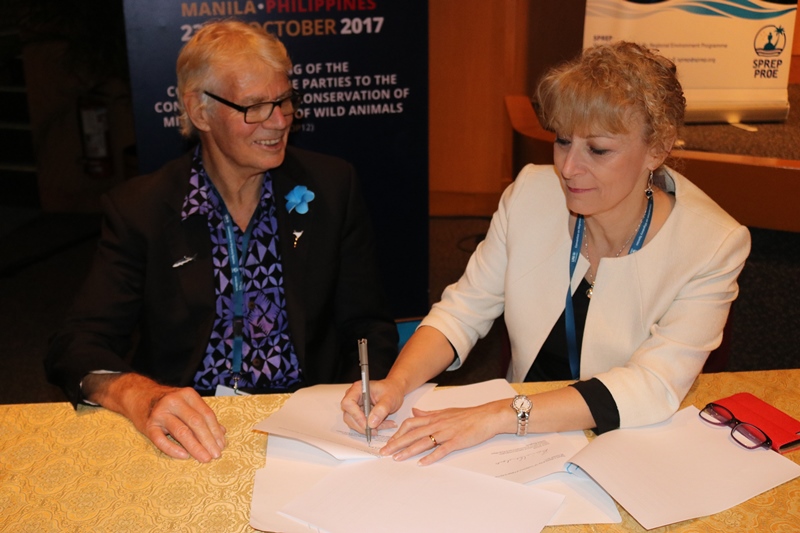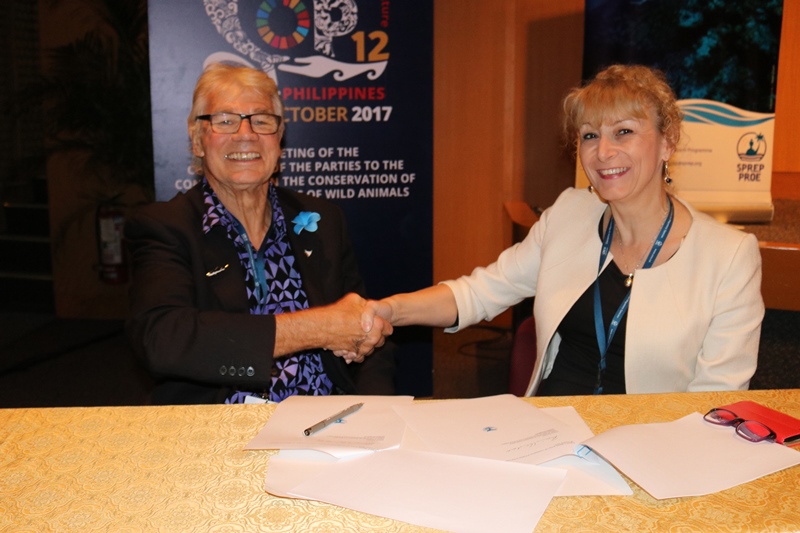
Island and Ocean Ecosystems
History was made at the Twelfth Conference of the Parties to the Convention on the Conservation of Migratory Species of Wildlife (CMS COP12) in Manila, Philippines. For the first time since its establishment in 1979, the Conference had to resort to voting on a number of listing proposals for large terrestrial African mammals. Until COP12, listing proposals have been accepted by consensus or have been withdrawn if consensus could not be achieved.
A further important event for SPREP, which was celebrated during a special Pacific side event at the CMS COP12, was the signing of the Pacific islands Year of the Whale Declaration by the United Kingdom on behalf of the Pitcairn Islands, following just two days after the signing of the Declaration by France, and bringing the total number of signatories to 14.
The Pacific islands Year of the Whale Declaration calls for strengthened whale conservation across the region and remains open for signing until 31 December, 2017.

L - R Mr Michael Donoghue and Ms Elaine Kendall
"It's encouraging to see states coming together to promote better conservation outcomes for cetaceans. This is a real opportunity to work constructively together, as we find ways to tackle the global threats facing our cetaceans," said Ms Elanie Kendall, Head of International Species Conservation at the Department for Environment, Food and Rural Affairs of the United Kingdom.
"As the United Kingdom has already stated, the moratorium on commercial whaling is extremely important to us and we remain committed to the conservation of cetaceans globally. We welcome this Declaration and we are very pleased to be able to sign it here at the CMS COP12."
The United Kingdom unites with Australia, Cook Islands, Fiji, France, New Caledonia, New Zealand, Palau, Papua New Guinea, Samoa, Tokelau, Tonga, Tuvalu and the United States in their commitment to Pacific whale conservation, as signatories to the Declaration, a key achievement of the Secretariat of the Pacific Regional Environment Programme's (SPREP) Year of the Whale.

"We continue to be inspired by the support from our SPREP Members to protect Pacific Whales," said Mr Michael Donoghue, SPREP's Threatened and Migratory Species Adviser.
"Fourteen SPREP Members have established whale sanctuaries in their Exclusive Economic Zones, totalling over 12 million square kilometres of ocean, and this latest signing from the United Kingdom highlights the conservation leadership of our Members. The Pacific Year of the Whale Declaration is still open for signatures and we look forward to further progress and new signatories that may still be added."
The signing of the Pacific Whale Declaration took place at the Our Pacific, Our Sharks, Our Responsibility event on 26 October during the CMS COP12. The event also featured presentations from SPREP, Palau, Samoa and Sri Lanka.
The CMS COP12 is held from 23 to 28 October, 2017 in Manila, Philippines. The Pacific islands are part of the Oceania Region which consists of Australia, Cook Islands, Fiji, New Zealand, Palau, Philippines and Samoa. For more information please visit: http://www.cms.int/en/cop12
Work to enhance and strengthen Pacific representation and engagement at the CMS COP12 is supported by The Pew Charitable Trusts as well as the Second Phase of the ACPMEA project, an initiative of the African Caribbean Pacific group of countries, funded by the European Union, implemented in partnership by UN Environment and executed by SPREP.
A further important event for SPREP, which was celebrated during a special Pacific side event at the CMS COP12, was the signing of the Pacific islands Year of the Whale Declaration by the United Kingdom on behalf of the Pitcairn Islands, following just two days after the signing of the Declaration by France, and bringing the total number of signatories to 14.
The Pacific islands Year of the Whale Declaration calls for strengthened whale conservation across the region and remains open for signing until 31 December, 2017.

L - R Mr Michael Donoghue and Ms Elaine Kendall
"It's encouraging to see states coming together to promote better conservation outcomes for cetaceans. This is a real opportunity to work constructively together, as we find ways to tackle the global threats facing our cetaceans," said Ms Elanie Kendall, Head of International Species Conservation at the Department for Environment, Food and Rural Affairs of the United Kingdom.
"As the United Kingdom has already stated, the moratorium on commercial whaling is extremely important to us and we remain committed to the conservation of cetaceans globally. We welcome this Declaration and we are very pleased to be able to sign it here at the CMS COP12."
The United Kingdom unites with Australia, Cook Islands, Fiji, France, New Caledonia, New Zealand, Palau, Papua New Guinea, Samoa, Tokelau, Tonga, Tuvalu and the United States in their commitment to Pacific whale conservation, as signatories to the Declaration, a key achievement of the Secretariat of the Pacific Regional Environment Programme's (SPREP) Year of the Whale.

"Fourteen SPREP Members have established whale sanctuaries in their Exclusive Economic Zones, totalling over 12 million square kilometres of ocean, and this latest signing from the United Kingdom highlights the conservation leadership of our Members. The Pacific Year of the Whale Declaration is still open for signatures and we look forward to further progress and new signatories that may still be added."
The signing of the Pacific Whale Declaration took place at the Our Pacific, Our Sharks, Our Responsibility event on 26 October during the CMS COP12. The event also featured presentations from SPREP, Palau, Samoa and Sri Lanka.
The CMS COP12 is held from 23 to 28 October, 2017 in Manila, Philippines. The Pacific islands are part of the Oceania Region which consists of Australia, Cook Islands, Fiji, New Zealand, Palau, Philippines and Samoa. For more information please visit: http://www.cms.int/en/cop12
Work to enhance and strengthen Pacific representation and engagement at the CMS COP12 is supported by The Pew Charitable Trusts as well as the Second Phase of the ACPMEA project, an initiative of the African Caribbean Pacific group of countries, funded by the European Union, implemented in partnership by UN Environment and executed by SPREP.